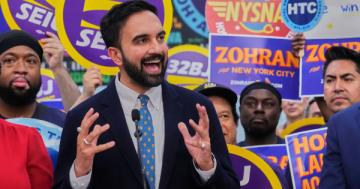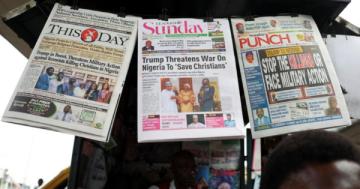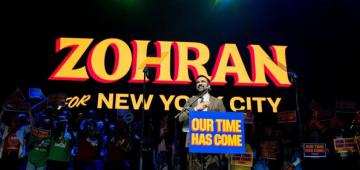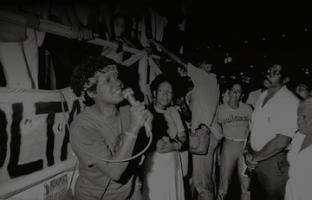The writers and creative artists the author examines are trying to make sense of a new world order as they engage in new forms of world making.
“Representations of matrimony have been used as an entry point for theorizing racialized gender subjectivity, domesticity, and political autonomy.”
In this series, we ask acclaimed authors to answer five questions about their book. This week’s featured author is Aneeka Ayanna Henderson. Henderson is Assistant Professor of Sexuality, Women's, and Gender studies at Amherst College. Her book is Veil and Vow: Marriage Matters in Contemporary African American Culture.
Roberto Sirvent: How can your book help BAR readers understand the current political and social climate?
Aneeka Henderson: Veil and Vow (University of North Carolina Press | Gender and American Culture Series) argues that portraits of courtship and marriage in the popular and political imaginary are an indispensable mode of reassessing family formation. BAR Readers will see that Veil and Vow is not monogamously wedded to one field or discipline; I use theories from African American studies, women's studies, and literary studies to examine female subjectivity, intimacy, and familial bonds, but the central queries anchoring my scholarship circulate around what these depictions covertly and explicitly evoke across a wide range of fictional texts. Veil and Vow begins by historicizing the ways in which representations of matrimony have been used as an entry point for theorizing racialized gender subjectivity, domesticity, and political autonomy. I move to critically examining political claims and legislation such as the criminalization of same-sex marriage in the 1996 Defense of Marriage Act (DOMA) alongside contemporary narratives and creative work, in order to expose the fiction and “fairy tale” in political policy and the political stakes of fictional texts.
Though the 1996 DOMA was more than twenty years ago, our current political and social climate remains fraught. Veil and Vow's attention to the ways in which African American communities have long wrestled with the meaning and significance of intimacy, courtship, and marriage as well as ubiquitous political phrases such as "family values" can help BAR readers better understand the progress and challenges we face in our current political and social moment. I discuss how African American people have long been ingenious in the way they have stitched together various forms of kinship and family despite systemic obstacles, but are still grappling with some of the same language, battles, and assumptions about marriage and family formation.
What do you hope activists and community organizers will take away from reading your book?
I am delighted that activists and community organizers will have an opportunity to read Veil and Vow and I hope they will think about the complex ways that political and popular culture intervenes and enriches our conversations about African American family formation. Rather than rehearse the sweeping generalizations in political discourse pronouncing marriage as wholly “good” or “bad,” I shift my focus to highlighting and uncovering the nuance in portraits of courtship and marriage in fiction, film, and music.
As it moves across and between print, sonic, and visual culture, Veil and Vow remains sharply focused on late twentieth and early twenty-first century African American cultural production. My analysis and archive begins in 1989 with Terry McMillan's novel Disappearing Acts and ends in the year 2000 with Gina Prince-Bythewood's film Love and Basketball. The texts I explore, which I situate within a larger African American cultural canon, are often deemed simplistic and contrived. By reading against the grain an archive that registers as supposedly apolitical and unimportant, I offer an intervention that will help activists and community organizers dismantle characterizations of Black romantic desire as frivolous and superficial. Moreover, Veil and Vow affords us a new opportunity to grapple with old questions, including who is imagined as a citizen—a designation bound to who is imagined as a “wife” and “marriageable.” As I explain in Veil and Vow, state apparatuses sanction broad forms of punishment for African American people whether they desire these labels or not.
We know readers will learn a lot from your book, but what do you hope readers will un-learn? In other words, is there a particular ideology you’re hoping to dismantle?
This is a wonderful question because it makes me think about how Veil and Vow has its own origin story. Writing Veil and Vow was arduous, but it galvanized a fascinating learning and un-learning process for me. In the very early stages of writing this book, I had a very different idea and image of what Veil and Vow would look like. As I critically examined varied texts and dug through archival materials, I shifted my analytical trajectory to thinking about cultural production that went beyond merely analyzing the physical text of the novel or film. Just as I did, I hope that readers will un-learn thinking about popular culture as a supposed apolitical cultural domain that is completely separate from the ostensibly serious landscape of political commentary and change. Veil and Vow explores the complicated kinship between them. I argue that this political and cultural consanguinity unmasks the discrepancy between the vows that political leaders ask of their constituents and the vows they pledge to those they consider legitimate citizens. This coupling also reveals the tacit and conspicuous political pressures that function as unruly antagonists and shape the process and depiction of courtship in these texts. By drawing these connections, Veil and Vow illuminates the seam binding the ways in which political and popular texts refashion the notion of family.
At the same time, I hope that readers unlearn envisioning popular culture as a verisimilar text that is incapable of offering its audience and readers new ways to think about and reconsider art, imaginary worlds, creative production, and the relationship between a novel or film, for example, to a larger African American cultural canon.
Who are the intellectual heroes that inspire your work?
I have a long list of intellectual heroes, so it is difficult to provide a comprehensive list. Nevertheless, I am grateful to have so many intellectual trailblazers that can and do serve as a source of inspiration for my writing and thinking. I am inspired and fascinated by so many of the texts, writers, artists, scholars, and theorists that I engage with in Veil and Vow and many other people who figure less prominently in the book such as Toni Morrison, Aretha Franklin, Dee Rees, Gwendolyn Brooks, Ann Petry, Marlon Riggs, Dorothy West, Audre Lorde, Tayari Jones, June Jordan, Carrie Mae Weems, Titus Kaphar, Mickalene Thomas, Lorna Simpson, Serena Williams, Venus Williams, Jay-Z, and Mary J Blige.
In what way does your book help us imagine new worlds?
This is an important question because I contend that the writers and creative artists I examine in this project are trying to make sense of a new world order as they engage in new forms of world making. At its core, Veil and Vow is an interdisciplinary monograph, so it helps us imagine a new world in which the narratives of intimacy and desire are complex and multidimensional. It also allows us to conceptualize a new world in which a robust archive of African American fiction, film, and music live at the center and are not thrust in the margins or buried under political spectacle. In many ways, this project helps us envision and recapture the importance of fiction and cultural texts to African American communities and survival.
Roberto Sirvent is Professor of Political and Social Ethics at Hope International University in Fullerton, CA. He is co-author, with fellow BAR contributor Danny Haiphong, of the new book, American Exceptionalism and American Innocence: A People’s History of Fake News—From the Revolutionary War to the War on Terror.
COMMENTS?Please join the conversation on Black Agenda Report's Facebook page at http://facebook.com/blackagendareportOr, you can comment by emailing us at comments@blackagendareport.com



















